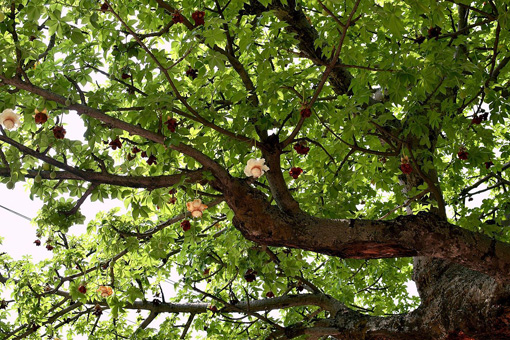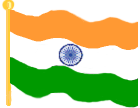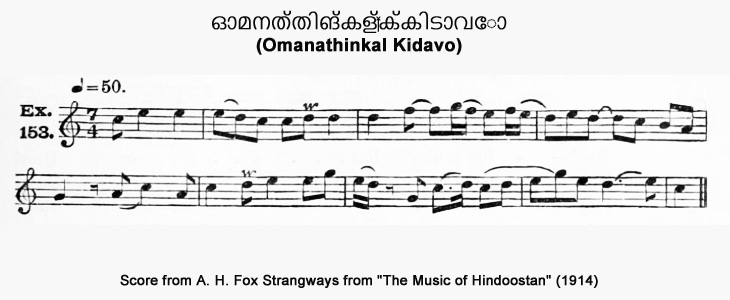ഓമനത്തിങ്കള്ക്കിടാവോ
(Omanathinkal Kidavo)
"In the Malayalam language, there is a rich collection of traditional lullabies, known as 'tharaattu Pattu'. One of the most famous is 'Omanathinkal Kidavo', written and composed by poet lyricist Irayimman Thampi. This lullaby was written for the queen of Travancore to sing to her son young prince Swathi Thirunal, who later became the king and a famous musician…
His birth was a long-awaited event for the royal family since it faced the threat of being annexed into British India under the Doctrine of Lapse for the want of a male heir. The lyrics of the poem reflect this sense of relief when it refers to the baby as a 'treasure from God' and 'the fruit of the tree of fortune'.
An interesting feature of this lullaby is that it doesn't mention the word sleep in it even once." – Wikipedia
The Pronunciation can be found in the Song Notes below.

ഓമനത്തിങ്കള്ക്കിടാവോ
(Omanathinkal Kidavo)
This Sweet Babe
Lullaby
Lullaby
(Malayalam)
(English)
ഓമനത്തിങ്കള്ക്കിടാവോ- നല്ല കോമളത്താമരപ്പൂവോ
പൂവില് നിറഞ്ഞ മധുവോ- പരിപൂര്ണേന്ദു തന്റെ നിലാവോ
പുത്തന് പവിഴക്കൊടിയോ- ചെറു തത്തകള് കൊഞ്ചും മൊഴിയോ
ചാഞ്ചാടിയാടും മയിലോ - മൃദു പഞ്ചമം പാടും കുയിലോ
തുള്ളുമിളമാന്കിടാവോ - ശോഭ കൊള്ളുന്നോരന്നക്കൊടിയോ
ഈശ്വരന് തന്ന നിധിയോ - പരമേശ്വരിയേന്തും കിളിയോ
പാരിജാതത്തിന് തളിരോ - എന്റെ ഭാഗ്യദ്രുമത്തിന് ഫലമോ
വാത്സല്യരത്നത്തെ വയ്പ്പാന് - മമ വായ്ച്ചൊരു കാഞ്ചനച്ചെപ്പോ
ദൃഷ്ടിക്കു വച്ചോരമൃതോ - കൂരിരുട്ടത്തു വച്ച വിളക്കോ
കീര്ത്തിലതയ്ക്കുള്ള വിത്തോ - എന്നും കേടു വരാതുള്ള മുത്തോ
ആര്ത്തിതിമിരം കളവാന് - ഉള്ള മാര്ത്താണ്ഡദേവപ്രഭയോ
സുക്തിയില് കണ്ട പൊരുളോ - അതിസൂക്ഷ്മമാം വീണാരവമോ
വന്പിച്ച സന്തോഷവല്ലി - തന്റെ കൊമ്പത്തു പൂത്ത പൂവല്ലി
പിച്ചകത്തിന് മലര്ച്ചെണ്ടോ - നാവിനിച്ഛ നല്കുന്ന കല്ക്കണ്ടോ
കസ്തൂരി തന്റെ മണമോ - ഏറ്റ സത്തുക്കൾക്കുള്ള ഗുണമോ
പൂമണമേറ്റൊരു കാറ്റോ - ഏറ്റം പൊന്നില് തെളിഞ്ഞുള്ള മാറ്റോ
കാച്ചിക്കുറുക്കിയ പാലോ - നല്ല ഗന്ധമെഴും പനിനീരോ
നന്മ വിളയും നിലമോ - ബഹുധര്മങ്ങള് വാഴും ഗൃഹമോ
ദാഹം കളയും ജലമോ - മാര്ഗഖേദം കളയും തണലോ
വാടാത്ത മല്ലികപ്പൂവോ - ഞാനും തേടിവച്ചുള്ള ധനമോ
കണ്ണിനു നല്ല കണിയോ - മമ കൈവന്ന ചിന്താമണിയോ
ലാവണ്യപുണ്യനദിയോ - ഉണ്ണിക്കാര്വര്ണ്ണന് തന്റെ കളിയോ
ലക്ഷ്മീഭഗവതി തന്റെ - തിരുനെറ്റിയിലിട്ട കുറിയോ
എന്നുണ്ണിക്കൃഷ്ണന് ജനിച്ചോ - പാരിലിങ്ങനെ വേഷം ധരിച്ചോ
പദ്മനാഭന് തന് കൃപയോ - മുറ്റും ഭാഗ്യം വരുന്ന വഴിയോ
Is this sweet babe
The bright crescent moon, or the charming flower of the lotus,
The honey in a flower, or the lustre of the full moon,
A pure coral gem, or the pleasant chatter of parrots,
A dancing peacock, or a sweet singing bird,
A bounding young deer, or a bright shining swan,
A treasure from God, or the pet parrot in the hands of Isvari (1)
The tender leaf of the kalpa (2) tree, or the fruit of my tree of fortune,
A golden casket to enclose the jewel of my love,
Nectar in my sight, or a light to dispel darkness,
The seed of my climbing fame, or a never-fading bright pearl,
The brilliance of the sun to dispel all the gloom of misery,
The Vedas (3) in a casket, or the melodious vina (4),
The lovely blossom put forth by the stout branch of my tree of enjoyment,
A cluster of pichaka (5) buds, or sugar-candy sweet on the tongue,
The fragrance of musk, the best of all good,
A breeze laden with the scent of flowers, or the essence of purest gold,
A bowl of fresh milk, or of sweet smelling rose-water,
The field of all virtue, or an abode of all duty,
A cup of thirst-quenching cold water, or a sheltering shade,
A never-failing mallika (6) flower, or my own stored up wealth,
The auspicious object of my gaze, or my most precious jewel,
A stream of virtuous beauty, or an image of the youthful Krishna,
The bright forehead mark of the goddess Lakshmi (7),
Or, by the mercy of Padmanabha (8), is it the source of my future happiness,
Is it, in this beautiful form, an Avatar (9) of Krishna Himself?
Notes
(1) Isvari is a name that means "goddess".
(2) Kalpa Tree - the tree of life, a sacred tree that's believed to be a wishing tree.
(3) Vedas – (veda is Sanskrit for "knowledge") A collection of hymns and ancient sacred Hindu texts written in India most likely between 1500 – 1200 BCE.
(4) Vina (or "veena") an Indian stringed musical instrument.
(5) Pichaka – A flower in the jasmine family (Royal jasmine jasminum grandiflorum)
(6) Mallika Flower – A flower in the jasmine family.
(7) The Goddess Lakshmi - the Hindu goddess of wealth, fortune and prosperity.
(8) Padmanabha - a manifestation of the Hindu god Vishnu with a lotus issuing from his navel.
(9) An avatar is the incarnation of a Hindu deity.
Pronunciation
Omanathinkal Kidavo,
Nalla Komala Thamara Poovo,
Poovil Niranja Madhuvo,
Pari poornendu thande nilavo,
Puthan Pavizha kodiyo,
cheru thathakal konjum mozhiyo,
Chanjadiyadum Mayilo,
mridhu panjamam padum kuyilo,
Thullumilaman kidavo,
sobha kollunnorannakodiyo,
Eswaran Thanna Nidhiyo,
Parameshwariyenthum kiliyo,
Parijathathin Thaliro,
ente bhagya drumathin phalamo,
Vatsalya ratnathe veppan,
ma ma vachoru kanchana cheppo,
Drishtikku vechoramrutho,
kooriruttathu vecha vilakko,
Keerthi lathakkulla vitho,
ennum kedu varathulla mutho,
Arthi thimiram kalavan
ulla marthanda deva prabhayo,
Sookthiyil kanda porulo,
athi sookshamam veenaravamo,
Vambicha Sandoshavalli,
thande kombathu pootha poovalli,
Pichakathin Malar chendo,
navinnischa nalkunna kalkando,
Kasthuri thande manamo,
perthum sathukkalkulla gunamo,
Poomanametoru katto,
ettam ponnil kalarnnoru matto,
Kachkkurukkiya Palo,
nalla gandhamezhum panineero,
Nanma Vilayum nilamo,
bahu dharmangal vazhum grahamo,
Daham kalayum jalamo,
marga khetham kalayum thanalo,
Vadatha mallikappovo,
jnanum thedi vachulla dhanamo,
Kanninu Nalla Kaniyo,
ma ma kai vanna chinthamaniyo,
Lavanya Punya Nadhiyo,
Unni karvarnnan thande kaliyo,
Lakshmi bhagavathi thande thirunetti melitta kuriyo,
Ennunnikrishnan Janicho, Parilingane Vesham Dharicho,
Padmanabhan Than Kripayo, Muttum bhagyam varunna vazhiyo.
Comments
Based on a post on a Facebook page called "Heart Beats", it seems that even though this lullaby is well-known, not many people know the full lyrics: "From the date it published it is the most popular lullabies among us, but NO-ONE knows the full lyrics..."
According to Wikipedia, "The song lends itself well to the expressions of the navarasas [Indian art evolved with an emphasis on inducing special spiritual or philosophical states in the audience] and is therefore often set to dance." If you go onto YouTube and type in the name of the song, "Omanathinkal Kidavo", some videos will show women dancing to it.


Thanks!
Thanks!
Thanks!
Thanks and Acknowledgements
Translation by A. H. Fox Strangways from "The Music of Hindoostan" (1914).
Image of Kalpa Tree: Kalpavriksha with Flowers in Ranchi, Jharkhand by Gurpreet Singh Ranchi, cc.

























